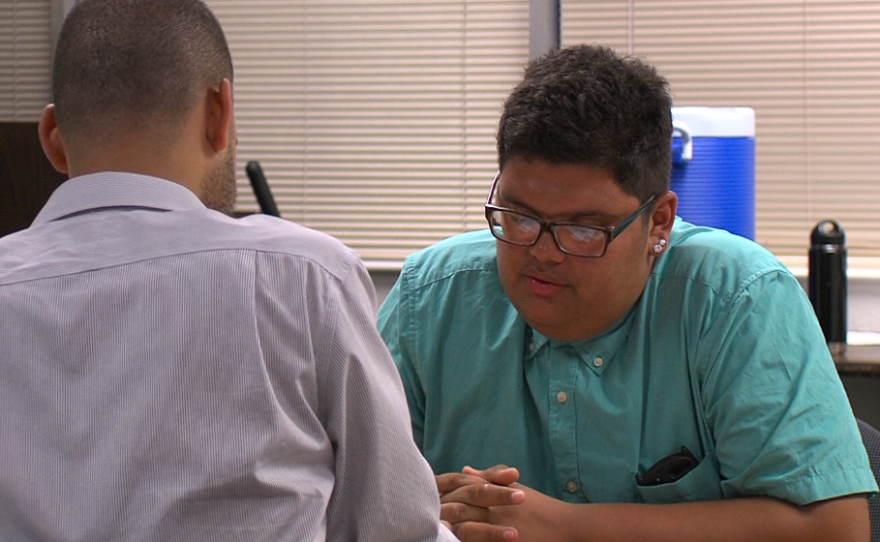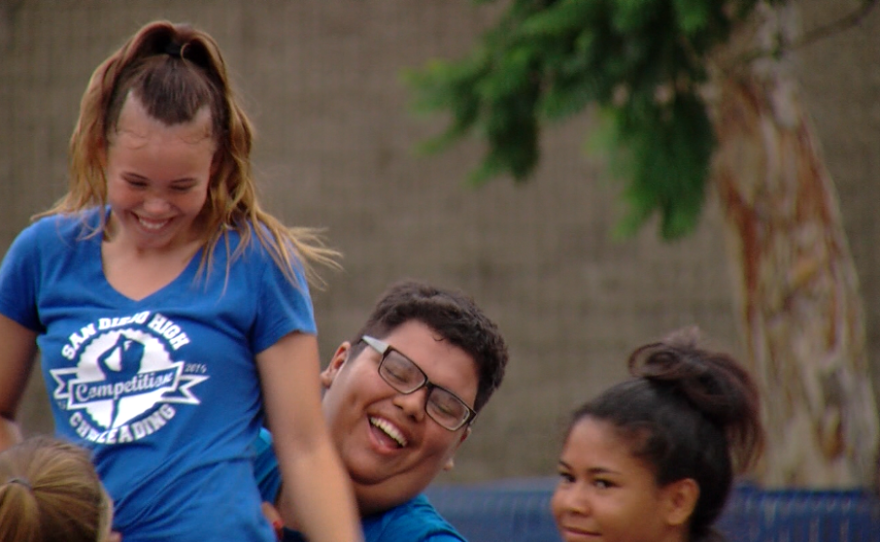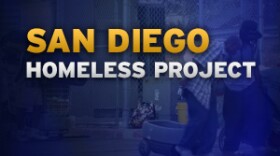It's summer break but not for cheerleaders at San Diego High School. On a recent Monday, they were on campus practicing a new stunt — one that sends a petite girl with an infectious smile twisting in the air.
"I love my flyer," said Marco Manzo. "We throw her in the air for Christ's sake. I catch her and it's like, 'OK I got you. We're cool.'"
The 16-year-old towers over his teammates at the base of their formation, ready to catch every fall.
It's Marco's first year on the team.
"Cheer was always the thing that caught my eye," he said. "It was like, 'I want this. I want to be able to have a family other than my family.’"
A couple of years ago, Marco became homeless. He said his mother asked him to move out. Home had become a volatile place.
"I was very angry because my father had left me," Marco said. "I mean, it's a two-way street. I'm not going to say my mother was a horrible person. It was also me. I guess I held a lot of the anger toward her, but it really wasn't toward her. So I was a very, very aggressive person, and she was also very aggressive."
Marco’s mom could not be reached for this story.
After Marco left home, he spent seven months couch-surfing. He says he spent some nights on the street.
"I would say homeless is not being able to go home for whatever reason. You just, you can't go home. You don't have a home. You know you just can't go there," Marco said. "You're on your own. So that's how it was. I was like, 'I don't have a family, I'm homeless now.'"
The San Diego County Office of Education estimates more than 23,000 students in the region experienced homelessness last school year. That can include children whose families are in shelters, on the streets, living in cars or couch-surfing.
At San Diego High, administrators say about 20 percent of the students experience those or similar situations.
Homeless advocates have long said such estimates aren't perfect. But even more imperfect, said Mark Lim, is getting teens like Marco to let someone know they’re alone and without a home. The Regional Task Force on the Homeless counted 145 such children in San Diego County when it did its annual count in January.
"They’re a very hard population to find," Lim said. "They're very sensitive about that issue. They don't want to be found, and they have a very big distrust with authority figures — teachers, police officers, etc."
Lim works at the Toussaint Academy in downtown San Diego, where Marco now lives. It houses and supports up to 35 teens until they're 19. Their parents remain their guardians, but Toussaint gets the young people through high school and on to self-sufficiency.
Essentially, it works to reverse the outcomes expected for youth like Marco — among them, homelessness in adulthood. Lim said finding and serving unaccompanied teens plays an important role in reducing the number of people on the streets.
"This kind of falls in the characteristics of kids that aren't foster youth, not emancipated, but kind of in the middle ground there, which is still a very significant population," Lim said. "Kids that may not feel comfortable being at home or have no place to go but don't want to be in the system yet. So where do these kids find their services? That's where Toussaint steps in."
Case workers there make sure the residents are enrolled in school, applying for jobs and addressing their emotional needs. For Marco, that meant developing ways to cope with the anxiety that fueled his outbursts.
For residents who do work — Marco isn't working because he's focused on school and cheerleading — Toussaint puts 60 percent of their pay into an account. The academy then returns the money to the residents in installments when they strike out on their own.
And more and more, striking out on their own means going to college.
Of Toussaint's four graduating seniors, one is headed to California State University, Monterey Bay, and another to San Diego City College this fall. The other two are working full time. In 2015, both graduates went on to four-year and community colleges.

This year, Toussaint partnered with C2 Education, a private tutoring company that typically helps students in higher income communities such as Del Mar and La Jolla get into college. Twice a week, C2 tutors work with the teens at the academy to bring up their grades and chart a path toward college.
When Marco was homeless, he had missed 150 days of school and his GPA had dropped to 1.0. After a little more than a year at Toussaint, he has a 3.5 GPA.
"Now it's like my head is on tight," Marco said. "I know what I'm doing, and I can look toward my future now instead of being worried about tomorrow."
Marco said he hopes that future includes a spot at the University of California, Berkeley. His tutor, Saba Shafizadeh, is helping him bring up his SAT scores, complete the college application and apply for financial aid.
"It's not, 'if I go to school.' It's, 'when I go to school,'" Shafizadeh said. "It's not, 'yeah, if I go to school and get a job.' It's, 'What do I do in school to make the world a better place?'"
Marco says he wants to become a lawyer and leave his mark as a judge one day. But first, he wants to help get his cheer family to the national championship competition in February.







